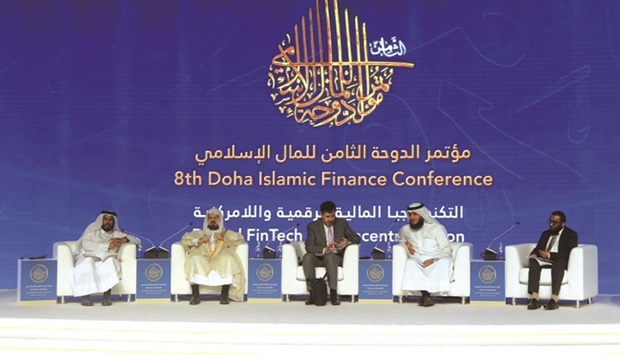Participants in a workshop organised within the activities of the Community Financial Culture Week accompanying the 8th Doha Islamic Finance Conference, organised by Bait Al Mashura Finance Consultations, confirmed that inflation rates in Qatar are within the safe range, as estimates indicate that the average annual inflation rate in Qatar will record 3.1% in 2022, and then decline to the level of 2.1% in 2023.
Dr Omar al-Ababneh, Shariah Supervisory and Audit Officer at Bait Al-Mashura, stressed during the workshop that inflation rates in Qatar are within the safe range, as estimates by the Oxford Economics institution indicate that the average annual inflation rate in Qatar will record 3.1% this year, and then drop to of 2.1% next year.
He pointed out that the International Monetary Fund expects inflation rates in Qatar to reach the level of 3.2% in 2022, and the Economist Intelligence suggests that inflation rate in Qatar would reach 3% during the current year.
Al-Ababneh indicated that the fluctuation in inflation rates at levels between 2% and a little more than 3%, represents a safe range, which means that inflation is under control in Qatar, especially since this comes at a time when supply chains are experiencing crises as a result of geopolitical turmoil globally, noting that the Qatar Central Bank closely monitors the situation and has monetary and financial tools to curb inflation if the levels go out of the safe range, while the strength of the Qatari riyal plays a major role in controlling inflation, as the QCB fixes the exchange rate at 3.64 riyals to the dollar.
He explained that Qatar is in a position to face the challenges of inflation, while the State's plan, which is being implemented to achieve food security and self-sufficiency, plays a major role in controlling the rhythm of the market, as well as the important role of the Ministry of Commerce and Industry in monitoring and intensifying its inspection campaigns to deter violators and control prices.
Professor of Islamic Finance and Economics and Programme Coordinator at the College of Islamic Studies, HBKU, Dr Ahmet Faruk said that digital transformations present great opportunities for the Islamic financial industry, foremost of which is increasing access to and facilitation of Islamic financial services, while accelerating payment processes.
The 8th Doha Islamic Finance Conference called for the establishment of an independent Shariah studies centre specialising in Islamic financial technology, to supplement the industry with the provisions of its developments.
Dr Omar al-Ababneh, Shariah Supervisory and Audit Officer at Bait Al-Mashura, stressed during the workshop that inflation rates in Qatar are within the safe range, as estimates by the Oxford Economics institution indicate that the average annual inflation rate in Qatar will record 3.1% this year, and then drop to of 2.1% next year.
He pointed out that the International Monetary Fund expects inflation rates in Qatar to reach the level of 3.2% in 2022, and the Economist Intelligence suggests that inflation rate in Qatar would reach 3% during the current year.
Al-Ababneh indicated that the fluctuation in inflation rates at levels between 2% and a little more than 3%, represents a safe range, which means that inflation is under control in Qatar, especially since this comes at a time when supply chains are experiencing crises as a result of geopolitical turmoil globally, noting that the Qatar Central Bank closely monitors the situation and has monetary and financial tools to curb inflation if the levels go out of the safe range, while the strength of the Qatari riyal plays a major role in controlling inflation, as the QCB fixes the exchange rate at 3.64 riyals to the dollar.
He explained that Qatar is in a position to face the challenges of inflation, while the State's plan, which is being implemented to achieve food security and self-sufficiency, plays a major role in controlling the rhythm of the market, as well as the important role of the Ministry of Commerce and Industry in monitoring and intensifying its inspection campaigns to deter violators and control prices.
Professor of Islamic Finance and Economics and Programme Coordinator at the College of Islamic Studies, HBKU, Dr Ahmet Faruk said that digital transformations present great opportunities for the Islamic financial industry, foremost of which is increasing access to and facilitation of Islamic financial services, while accelerating payment processes.
The 8th Doha Islamic Finance Conference called for the establishment of an independent Shariah studies centre specialising in Islamic financial technology, to supplement the industry with the provisions of its developments.

